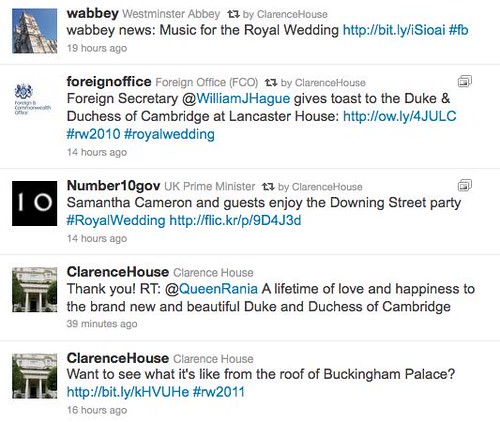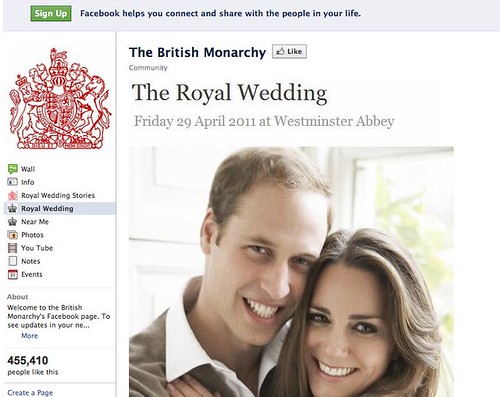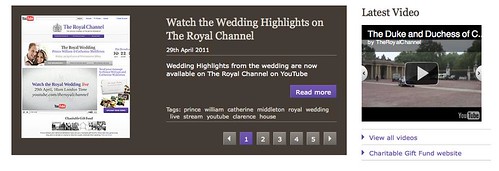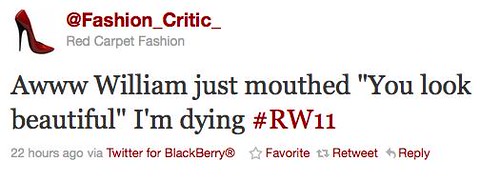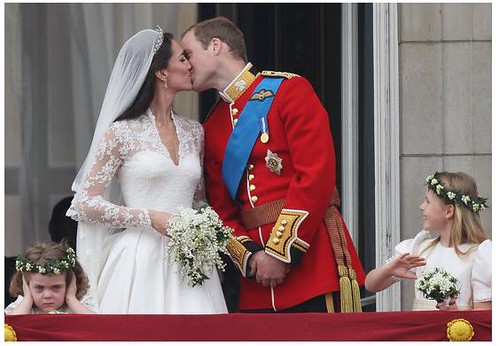- First we had Occupy. I loved the mashing together of the old and new, the rapid spread of ideas and the bravery and inventiveness of those who took considerable personal risks to further a cause which could not adequately be communicated through our older structures. Occupy is complex, messy and thought-provoking - exactly what politics needs.
- Second the riots, subsequent clean-up and political/punitive aftermath.
- Third, concern over many retail chains. Was this due to unemployment, lack of confidence in the economy, people's switch to online shopping or the start of a move away from corporate chains? Probably a combination of all of these things.
As many pointed out, outbursts like riots and occupations are not new. Nor do they exist because of web tools. This is the kind of dull argument that distracts from what is interesting about these happenings, because for most people web tools are no longer shiny, new things to be talked about as brands, they are woven into our lives. They are simply like the pavements we walk on or the houses we live in. It is no more newsworthy to say that riots were organised using BBM than it is to say that people live in tents. Both things may be of interest to those interested in technology or housing, but journalists will have to make more of an effort to keep our attention. We need more curation in 2012.
In Stoke, the Facebook ad process says that I can now reach 124,000 people over 18 within Stoke-on-Trent. Now that number needs to be treated with a pinch of salt, because some people will not have registered themselves in Stoke, others will be younger than 18, some will have more than one account and others may be living outside the city but have registered themselves with the nearest city. But bearing all that in mind, it's still a very high number. It is - if I've done the maths right - 61% of the amount of people registered to vote and 109% of the number of ballots issued in the 2010 general election. Yup, roughly speaking, more people have signed up for Facebook in Stoke-on-Trent than turned out to vote. Draw your own conclusions.
This indicator of the internet's popularity had other effects. For earlier adopters, Twitter because less like a few communities of interest and much more difficult to keep track of. Early in 2011, David Elks of the Sentinel could easily find nearly 100 people to snap up places for a Tweetup (and around half that actually turned up, which isn't bad in the web world), but finding coherence in follow-up actions proved difficult. I felt less able to stay in touch with many people I like enormously because there are just so many of you buggers. Indeed, everytime I try to weed people out I am just reminded of how interesting, nay inspiring, you all are. Add to that the awareness that there are so many more great people I have never connected with and it's easy to feel overwhelmed. It's a difficult problem for people who love the firehose because we can actually drown ourselves. I try to make sure I switch off (almost) as much as I dive in, but definitely felt that I missed a lot this year and I also lost a lot of time just trying to tune up my filtering tools, especially in light of changes they made.
What had been called the Stoke Twitter community lost some of its energy and a few hyperlocal blogs fell along the wayside. I felt at the time that this was inevitable and that bloggers should not feel under pressure to keep things going for ever. Partly in response, Facebook groups got quite busy but again those conversations seem to be waning a little. These pulses should, I think, be seen as part of the natural order of the web. People will gather and disperse again like shoals of fish and we don't need to create feeding frenzies just to get them to our ponds, we just need to make some more canals between them. Pitsnpots had a rocky year but ended it with the announcement that it is to be a pioneering project of the Journalism Foundation - well deserved recognition of the part it has played in Stoke's democratic history over the last couple of years and very promising for the future. Meanwhile the Sentinel started a digital column, great for local digital activists to reach paper readers, and 6 Towns Radio and My Tunstall both continued to thrive and develop. On my own projects, Delicious's decision to take down tag clouds took the wind out of my Social Stoke sails, but luckily this has now been reinstated and I have my tagging enthusiasm back again - with some help from the WEA volunteer Andrew we've now reached 1,548 links.
Despite all the challenges it will face, many of the advantages Stoke has make it well prepared for a good year. We have a mature sector of people working and volunteering in new media and a supportive old media. Everyone knows each other - that's always been the case but now Facebook and Linkedin makes it easier to see. We're a city of interconnected towns and villages with plentiful cheap buildings and land. Outside investors come and go - the commitment of Prince Charles' charities in particular gives hope for 2012 - while the dominance of the council in saying what can and cannot happen is being shaken up, albeit gradually. Many of our strengths were on display at the Stoke Stories conference which was ably organised by Tristram Hunt's team and the RSA. The conversations continue here.
What people need now to break through the gloom that is so pervasive is knowledge about the opportunities that mass adoption of the internet creates. Nearly all of us, including nonliners, are now connected to people who can reach each other with the click of a button. The exception is truly isolated individuals, for whom special attention - ie funding, not cuts - is needed. Our personal networks are excellent jumping off points to find forms of power that in many cases aren't new, but are more accessible to those who were previously disconnected from them. The other new thing about them is that they're made possible not by the web itself, but by the fact that we have these networks that can amplify and share what we do. Returning to the first three examples I quoted, they all showed how change can happen because we can now be more aware of each other's thoughts and feelings. The consequences of this can be good or bad and we can all play a role as influencers.
One of the reasons I highlighted the rise of online buying is that while it may well threaten retail jobs, there is an opportunity for people to start selling directly to customers around the world. We need policies and bold politicians that support people within an economic landscape that is likely to move very rapidly and unpredictably. We need to be able to seek and capitalise upon the good times, as well as support people through the bad. While the council's Mandate for Change vision is quite good on the former, no longer just putting all its eggs into one poorly-spelt retail basket, as a Labour controlled council they should, in my view, be fighting tooth-and-nail to maintain and even improve core services and community spaces.
So I've made another list: ten powers that we have now that more of us are online. All of them involve some learning and none of them should be seen as easy, but they are all things that I have seen other people achieve using the web. Many of you reading this will know how to get started so if you do, please help someone who doesn't. And if you know someone doing one of these things, take a second to retweet or share.
Now that we are (nearly) all online, we - you! - can do all this:
- trade
- connect with people you admire
- find work
- report your own news, and your town's
- run a TV channel
- build our own websites, networks and applications
- learn about almost anything
- contribute to policy and debate
- start big local or global movements
- raise funds
More ideas, and examples of the above in action, are very welcome. Happy New Year!

